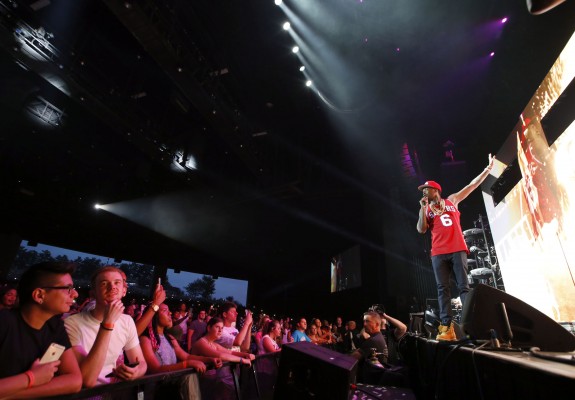The Return of Battle Rap: More Than Just Music
TNS
Hip hop recording artist Meek Mill performs at the Susquehanna Bank Center in Camden, N.J., on Thursday, Aug. 6, 2015. (Yong Kim/Philadelphia Daily News/TNS)
August 28, 2015
2015 has been a great year for hip-hop. Big name artists such as Big Sean and Kendrick Lamar have released albums, newcomer Fetty Wap dominated the charts, and Kanye West continues to tease listeners with SWISH, his upcoming album. But 2015 will also be remembered as the year that battle rap reemerged in mainstream hip-hop. In truth, it’s about time– we’ve been craving it for some time now. But it is important to keep in mind the context and nature of this art form so as to ensure that we characterize rap justly.
Rappers Drake and Meek Mill have been engaged in an ongoing feud for the greater portion of the summer. This all started when Meek Mill allegedly discovered and revealed that Drake did not write his own verse for the song “R.I.C.O.,” which appears on the latter’s Dreams Worth More Than Money. However, what followed was not a celebration of Meek for his actions, nor a berating of Drake for his (or lack thereof). Instead, it sparked one of the most entertaining rap feuds in recent memory.
Drake responded with the song “Charged Up,” in which he proclaimed that he was “done doing favors for people/cause it ain’t like [he] need the money [that he] make off a feature.” This was a clear reference to not only Drake’s contribution to the song in question, but also to his contribution to Meek’s 2012 hit “Amen.” To further continue the onslaught, Drake then released “Back to Back,” in which he posed the question as to whether Meek’s tour was “a world tour or [his] girl’s tour.” Additionally, Drake publicly agreed with a Twitter user’s comment on how Meek may not be “the best rapper in his relationship” with Nicki Minaj.
With his back against the wall, Meek responded with “I Wanna Know.” In the song, Meek premiered the reference track to Drake’s “Know Yourself,” and also compared the Canadian to Milli Vanilli. While this initiated fierce debates as to who the victor was, these same debates also highlighted how consumers have been yearning for a considerable rap battle for some time.
Why? Hip-hop feuds are not a new phenomenon. Who can forget Dr. Dre vs. Eazy-E, Biggie vs. 2Pac, and 50 Cent vs. everyone (Ja Rule, Fat Joe, Rick Ross and so on). The latter example indicates that 50 has been an important figure in this strain of hip-hop. When he began to fade into the background around the turn of the 2010s, so too did battle rap in mainstream hip-hop. As a consequence, listeners had to scour through the website World Star Hip Hop and YouTube in order to find a good old-fashioned rap battle. Luckily, Drake and Meek have helped to reignite this spirit. At the same time, however, if we do not contextualize this aspect of hip-hop, we run the risk of suggesting that this genre of music is “violent” or “aggressive” for its own sake, which would be as inaccurate as suggesting that “gangsta rap made them do it.”
Battling has been part of hip-hop since its origins in the South Bronx in the late 1970s. As the seminal film Wild Style shows, crews would use their words, and not their fists, to command respect. To fully understand the roots of these young people’s desires, one needs to consider the economics of this neighborhood at the time. With high unemployment rates, burning buildings and a lack of a social safety net, these young people’s socioeconomic positions were precarious ones. Therefore, their quest for respect was a response to the lack of economic support from the United States government, which continues to ignore this section of our country.
For this reason, battling has become almost inseparable from hip-hop’s identity. Even more significant is how our engagement with these battles suggests that battling is part of our American identity as well. This is further reinforced by the music battles between Mariah Carey and Eminem, and more recently, Taylor Swift and Katy Perry. Therefore, the tradition that Meek and Drake are engaged in is as American as burgers, pies and fireworks on the Fourth of July.













Margarita • Jul 14, 2017 at 4:41 pm
I spent a great deal of time to find something like this
Roy • Jun 27, 2017 at 11:28 am
This is really useful, thanks.